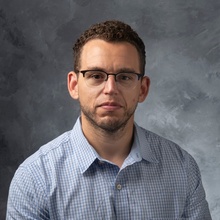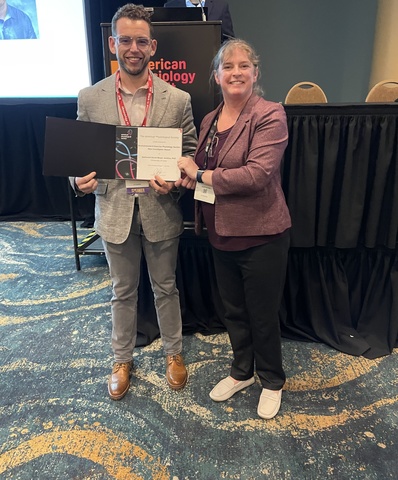By Charlotte Brookins
Less than six months after receiving a $3.7 million grant from the National Institutes of Health, assistant professor Nate Jenkins has again been recognized for his considerable research, this time by two different awards from the American Physiological Society.

“I was really floored and honored,” says Jenkins, a faculty member in the Department of Health and Human Physiology in the College of Liberal Arts and Sciences, on his dual recognitions. “I honestly didn’t think I had a shot.”
The first of the awards Jenkins received was the Shih-Chung Wang Young Investigator Award, which is presented to a member of outstanding promise in the field of physiology early in their career. In addition to attending that year’s American Physiology Summit, the recipient receives $10,000 to be put toward their research, as well as a certificate presented at the APS Awards Meeting. The award is also listed on the American Association of Universities’ National Research Council List of Highly Prestigious Awards.
The research that earned Jenkins this award revolves around the effects of lifestyle behaviors on physiology, specifically regarding cardiovascular health.

“I look at the effects of exercise, stress, and sleep on cardiovascular physiology and how these interact to contribute to long-term cardiovascular risk, particularly in at-risk populations,” Jenkins explains. “Over the past five years, our primary focus has been in how early life psychosocial stress promotes cardiovascular disease and understanding biologically relevant biobehavioral mechanisms.”
In addition to the Wang Young Investigator Award, Jenkins also received the APS’s Environmental and Exercise Physiology New Investigator Award. Like the previous honor, the EEP New Investigator Award recognizes a researcher in the APS’s EEP section early in their career whose work has made significant contributions to the EEP community.
Jenkins credits the College of Liberal Arts and Sciences, its strong connections to the hospital and clinical resources, and being surrounded by excellent and supportive colleagues for his success, as well as the support they have demonstrated during the growth of his career in health and human physiology.
“There are a ton of people who make things like this possible, including students, research staff, and colleagues who have supported me in various ways,” says Jenkins. “I’d also like to thank my wife and two kids, who are incredibly supportive and my biggest cheerleaders. These awards may be given to an individual, but it truly takes an army.